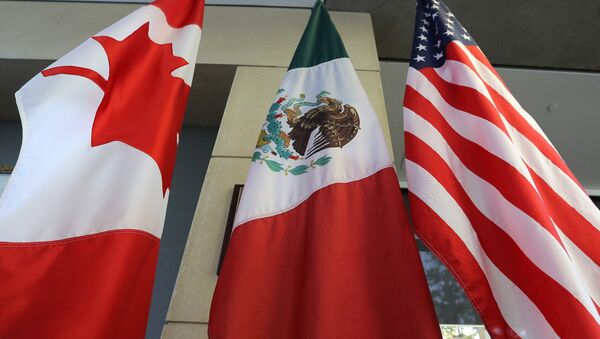The US, Canada and Mexico are trying to revise and re-negotiate their North American Free Trade Agreement (NAFTA) which came into effect on the first day of 1994. President Trump has strongly criticized the pact for creating an unfair playing ground, opening the border to cheap, tariff-free goods and Mexican nationals stealing jobs from US citizens.
However on Wednesday, the US leader said that he was open to bilateral trade pacts with either country if the three states fail to revise the pact.
Commenting on Donald Trump's recent announcement, Brenda Estefan, a foreign policy analyst and former security attaché at the Mexican Embassy in Washington, told Sputnik Radio that the US's proposals for a new treaty "undermine the entire agreement."
"What the US is putting on the table are very protectionist proposals, solely targeted at 'buy American,' she told Sputnik.
She further explained that when it comes to tenders in the US, the Mexican and the Canadian enterprises are limited in their participation. They can only participate with restrictions while US companies can participate in Mexican and Canadian tenders without any limitations, which is an example of pure protectionism.
"It seems to me that [Donald Trump] is trying to torpedo, to undermine negotiations in a certain way so that he either gets a super good agreement for his political weight or to be able to pull out of the entire thing," Brenda Estefan said.
She suggested that by putting the agreement in a precarious position, the US president might be trying to distract media and political circles from all the other crises that he is currently facing: He is having a rough time with his cabinet and faces a tough foreign policy agenda, including tense relations with a number of countries, such as Turkey, among others.
When the agreement between the three countries came into effect, it created one of the world’s largest free trade zones. According to reports, the US's trade with Mexico and Canada has more than tripled since then, growing more rapidly than its trade with the rest of the world.
The two countries have become the second and third largest exporters to the US, after China; and the leading importers of American products. Under the agreement, the three countries pay no tariffs or taxes on the goods that cross their borders.
If the US exits the deal, the goods will become subject to taxes, which will result not only in a sharp increase of prices and cuts in profits, but will also make the countries less competitive with other major global manufacturers in Asia and Europe.
Meanwhile, the European Union had signed free trade agreements with both Mexico (FTA EU-MX) and Canada (Comprehensive Economic and Trade Agreement, CETA) that lowered tariffs on most products to zero and thus increased their attractiveness.
"Business leaders across the country know firsthand that trade with Canada and Mexico has created American jobs, boosted economic growth and strengthened local economies, but we know we can do even more to seize the benefits of trade with our North American neighbors," the letter said.
It further urged Trump "to support America’s workers, farmers, ranchers and businesses of all sizes by protecting and preserving the deep economic ties and benefits the United States continues to enjoy under NAFTA."


